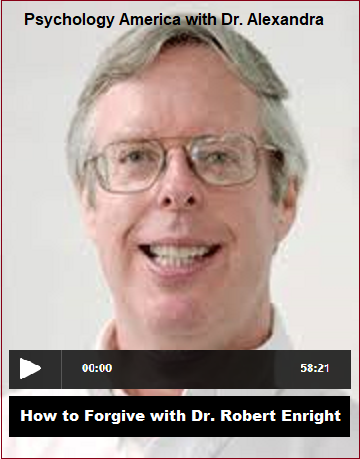Tagged: “forgiveness is a choice”
Isn’t it better to eliminate depression first, by psychotherapeutic means other than forgiveness, in a client prior to initiating forgiveness therapy?
Traditional psychotherapies are not necessarily as effective as forgiveness therapy. Therefore, it is best, in my opinion, to engage the client in forgiveness therapy, if this is chosen by the client. The depression then can lessen as the person continues on the forgiveness path.
I prefer anger to forgiveness. It empowers me. What do you think?
Anger at first when you are treated unjustly is reasonable because you are seeing that you are a person who deserves respect. Yet, where do you draw the line? When is this early anger sufficient? Do you want to keep the anger for a month? A year? How about 30 years? Also, what about the intensity of the anger. Do you want to be fuming inside for those 30 years? Do you think you will feel empowered if you live this way or could it wear you down?
I have believed that one does not forgive unless the other person apologizes. You say differently. Can you give me at least 3 reasons why it is ok to forgive someone who does not apologize or even refuses to do so?
Yes, I can give you three reasons as follows: 1) There is no other moral virtue on the planet that has a rule connected to it that someone else must engage in a certain behavior or say certain words before you can engage in that virtue. For example, you can be patient whenever you wish. Also, you can be fair to others no matter the circumstances. Why now is forgiveness the only moral virtue that must not emerge until the other person utters those three words: “I am sorry?”; 2) Your waiting until the other apologizes gives that person tremendous power over you. You could be stuck with harmful resentment or even hatred if the other refuses to let you forgive and be free of this toxic anger; 3) Your free will as a person is hampered if you must await permission from the other (with the words, “I am sorry”) before you can forgive. Here is a fourth reason: Suppose the person passes away before saying the three words. You now are stuck with the resentment with no possibility of releasing that potentially harmful emotion for the rest of your life.
Is it healthy to let the other person (whom you are forgiving) know that you are forgiving, or is it better to keep this to yourself?
When you tell the one who offended you that you are forgiving, please make sure that this person knows what forgiveness is and is not. In other words, if the person thinks that forgiveness is just “letting it go,” then this person might try to take advantage of you. If the person knows that forgiving is an act of mercy and it occurs along with a quest for justice, then it is good to let the person know you have forgiven.
‘Tis the Season: The 17 Podcasts of Forgiveness
December is often referred to, particularly in song, as “the most wonderful time of the year.” Soon there will be 17 more items to add to that list of reasons why this time of the year is so special—17 new podcasts focusing on how forgiveness can enhance your holidays and your life.
The “17 Days of Forgiveness” podcast series is a joint venture between forgiveness forerunner Dr. Robert Enright, co-founder of the International Forgiveness Institute (IFI), and Dr. Alexandra Miller Clark, Psy.D., a licensed psychologist in New Jersey whose upbeat podcast program “Psychology America,” has taken the Internet world by storm.
Psy.D., a licensed psychologist in New Jersey whose upbeat podcast program “Psychology America,” has taken the Internet world by storm.
“This new series is groundbreaking because each of the 17 podcasts focuses on just one element of the forgiveness process,” Dr. Alexandra explains. “That enables us to produce what I call ‘super brief episodes’ that are each between five and ten minutes in length.”
In the first program released on Dec. 1, for example, Dr. Alexandra asks just one question: “What is the definition of forgiveness?” Dr. Enright provides a complete yet succinct answer in less than five minutes of podcast time.
In the second episode of the series, Dr. Alexandra asks: “What are the benefits of forgiveness?” Dr. Enright’s response, less than nine minutes in length, summarizes decades of scientific research documenting the physical and emotional benefits of forgiveness.
The remaining episodes include:
3. What are the two paradoxes of forgiveness?
4. Does forgiveness have to be about religion?
5. What is it to work the “forgiveness muscle?”
6. How do we become “forgivingly fit?”
7. What are some of the obstacles to forgiving?
8. Why is an “eye for an eye” not the right way?
9. If I forgive, I’m afraid I’ll forget OR if I forgive, I’m afraid I won’t forget.
10. Why is forgiveness better than a neutral attitude toward the wrongdoer?
11. Isn’t forgiveness unhealthy repression?
12. Do I forgive if the person continues to hurt me?
13. Should I forgive immediately or should I take some time first?
14. How do we decide who to forgive first?
15. How long does it take to get emotional relief after forgiving?
16. How often should I forgive?
17. Can forgiveness and justice happen together?
New episodes of the series will be released every few days on the Psychology America website where they are available at no cost. No special software is required to tune into the podcasts and they can be accessed using Apple Podcasts, Buzzsprout Podcasts, Google Podcasts, Stitcher Podcasts, Pandora, Spotify, and other podcast apps. Website visitors can also subscribe at no cost to receive automatic email notification when new podcast episodes are posted.
 “Dr. Alexandra created and produced the 17 podcast episodes at absolutely no cost to the IFI,” according to Dr. Enright. “She knows that forgiveness can positively impact people who are hurting, and she is a fabulous forgiveness ambassador who is helping others learn about its amazing benefits.”
“Dr. Alexandra created and produced the 17 podcast episodes at absolutely no cost to the IFI,” according to Dr. Enright. “She knows that forgiveness can positively impact people who are hurting, and she is a fabulous forgiveness ambassador who is helping others learn about its amazing benefits.”
More than 65 podcast episodes are currently available on Dr. Alexandra’s website including two programs featuring interviews with Dr. Enright: “How to Forgive” (58 min.) and “Rehabilitating the ‘Forgotten People’: Prisoners” (1 hr. 7 min.).
Dr. Alexandra is a mother of four and an expert in family systems psychology, cognitive behavioral psychology (CBT) and clinical psychopharmacology. She has earned a Doctorate in Psychology, a master’s degree (Ed.S.) in Marriage and Family Therapy, and a Master of Science (MS) Degree in Clinical Psychopharmacology. She is the author of “There’s Always Hope”–– a children’s book that inspires hope and teaches empathy for the physically disabled.



